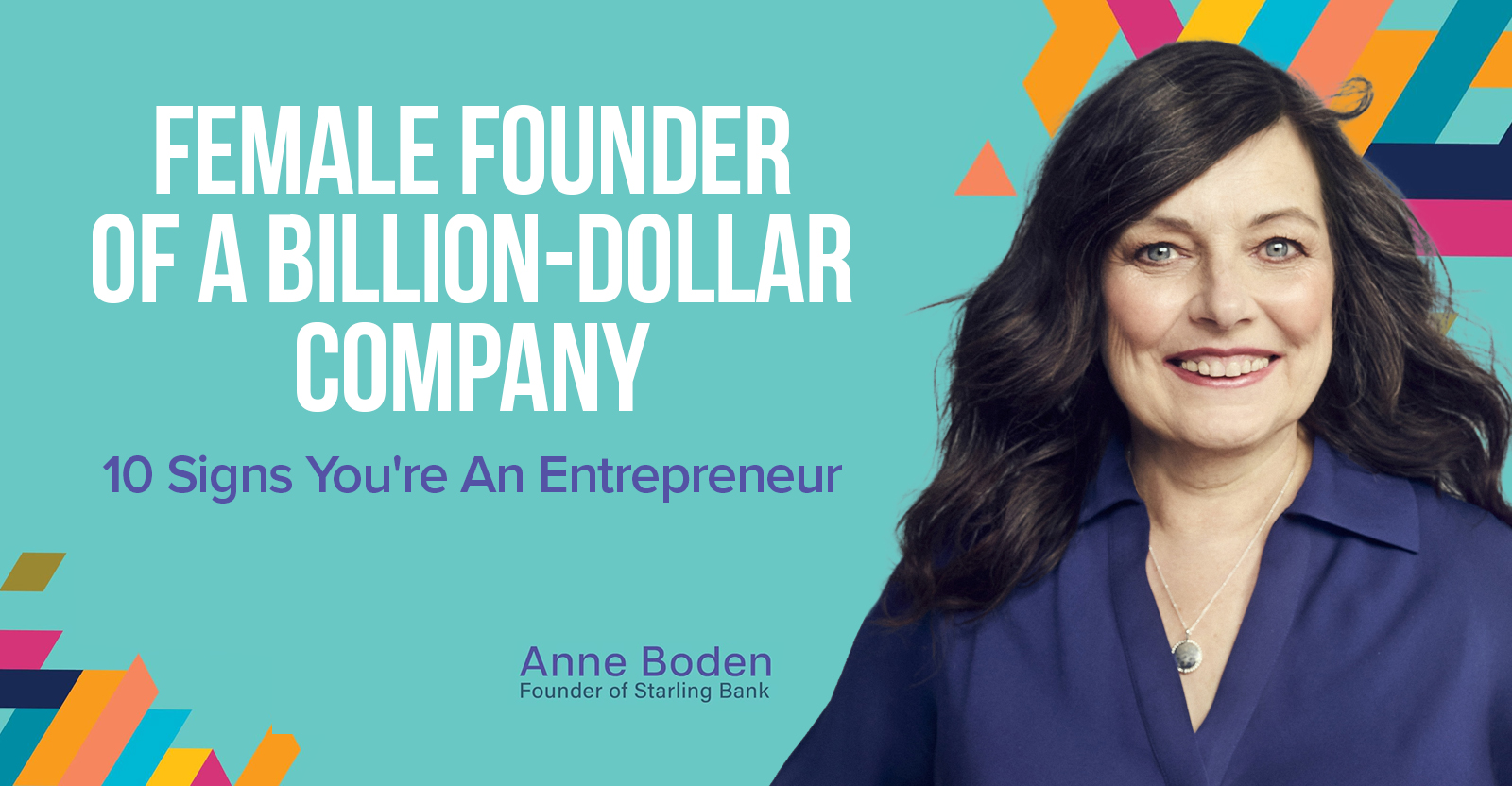I know what it is like to be a reluctant entrepreneur.
Back in 2014, when I first started thinking about Starling Bank, if anyone had told me, “Ah, so you are going to be an entrepreneur,” I’d have said, “Absolutely not.” I was similarly reluctant to use the word “founder.”
Growing up, I always believed entrepreneurs were inventors. They made something. Today’s example might be James Dyson, because he invented the first bagless vacuum cleaner.
Elon Musk invented a rocket that went into space. I didn’t believe I was like this. I had gone to university, joined Lloyd’s Bank as a graduate trainee, and then worked my way up the corporate ladder.
It wasn’t until Starling Bank became a unicorn, reaching a valuation of over £1 billion, that I finally relented on the word “entrepreneur.”
Since then, I have reflected on why I never saw myself as a bona fide entrepreneur.
My conclusion is that, when I started my business, I didn’t do it because I wanted to be an entrepreneur. I did it because I had long since grown disillusioned with the world of banking and was convinced that I knew what needed to be done to put things right.
I had zero doubt about my idea for a new type of bank. That, in itself, is the basis for entrepreneurship. What I called myself really didn’t matter.
If you, too, are a reluctant entrepreneur, it might be helpful if I began by sharing what I, and other female entrepreneurs, think about how to identify whether there is an entrepreneur lurking beneath the surface (whether or not you would like to admit it to yourself).
Here are 10 signs you are an entrepreneur:
1. You Don’t Accept “No” As An Answer
Anyone who gets discouraged by a “no” is never going to make it as an entrepreneur. I held meetings with more than 300 investors before I found someone interested in putting money into Starling Bank.
If I had given up at 10 meetings, or a hundred meetings, the business would never have gotten off the ground. Similarly, plenty of customers, regulators, potential hires, and seemingly everyone said no.
Hearing “no” time after time is part and parcel of being an entrepreneur. If you are the type to welcome this two-letter word as a challenge that allows you to show what you can do, then you’ve got the entrepreneur mindset.
2. Your Achievements Have Not Been Recognized (So Far)
Women, in particular, often get frustrated with corporate life because they feel underestimated or unrecognized.
Their input is ignored or played down. They report speaking up in meetings to put forward an idea, and it is met with silence, only for a male colleague to be praised when he repeats a virtually identical point later on.
I spent most of my career complaining about not getting the plum projects or not being paid enough, and very often was only able to make any progress by quitting one job to take another. In the end, I had to start my own business to achieve what I always believed to be my full potential.
It is quite possible that this is the reason why so many women become entrepreneurs following maternity leave.
After a break from the corporate world, they can’t face re-entering the fray where their achievements go unnoticed month after month. The idea of setting out alone and being judged on their own merits is more alluring.
3. You Don’t Care About Fitting In
Closely related to the above, many entrepreneurs have long since decided they don’t fit in, so don’t waste any time on it. When I started speaking with other female entrepreneurs, I was struck by just how different they were from the people I knew from corporate life.
In my previous career, I was surrounded by people who spent their entire careers trying to fit in. Entrepreneurs didn’t seem interested in all of that. They seemed more grounded and focused on the task at hand, rather than carefully weighing each word to see how they came across.
There’s an element of mischievousness here, too. It’s not enough to feel disgruntled about being passed over; you need to feel determined to do something to strike a blow at the establishment. Any entrepreneur who feels this way would be in fine company.
This is the motivation that spurred on Dame Stephanie Shirley, also known as Steve, who started a software house back in 1962 that introduced radical new flexible work practices for women in technology.
4. You’re A Dreamer (And A Little Naive)
Entrepreneurs who have previously had “proper jobs” often report spending a lot of time looking at their firms or bosses and imagining how they would do it better. Their imagination is filled with dreams and ideas.
Mixed in with this is a certain amount of naivety. During my own entrepreneurial journey, it really helped that I dreamed big, but also that I was a little naive about the scale of what I dreamed about.
When things were difficult, it helped me imagine the next bit had to be easier. I’d tell myself we only need to get this one thing done, and it’ll be plain sailing.
This was even though every single day as an entrepreneur is about solving a new problem.
5. You’re Competitive
For some reason, a desire to win is often viewed negatively, but it is a quality all entrepreneurs need. In fact, I have not met an entrepreneur who isn’t super-competitive.
During the toughest times, an arch-rival is what you need to keep going, even if that rival doesn’t really see your business as a competitor.
They are the mark. You need to get ahead of them to get closer to your goal. True entrepreneurs turn this rivalry into pure energy.
It should be said, this rivalry should be healthy. Going head-to-head with daggers drawn causes unnecessary tension and doesn’t help anyone.
New entrepreneurs are often quite surprised to hear that most founders often speak with other businesses in their sector. It’s a great way to swap ideas and can help everyone.
6. You’re Goal-Driven
Entrepreneurs are goal-driven. We like to take the initiative and solve problems, even if it means working on them for long periods to remove all obstacles that get in the way. This also means they are strategic in their game plans.
Right from the beginning at Starling, I had a plan in mind – and it was a grand plan.
Whenever I talked to anyone about anything to do with the business, I was thinking ahead about how what we were discussing would impact my end goal.
7. You’re Constantly Looking To Learn Something And Improve
Whenever I approach something new, my first instinct is to head to a bookshop. I’ve been the same since I was a young child when my parents gave me an unlimited budget to spend at our local one. I always bought non-fiction and academic books and would pore over them to find out how to do things.
One year, my parents bought me a second-hand, 1956 copy of the Encyclopaedia Britannica – all 24 volumes. I devoured every page and, perhaps oddly, still have an incredible knowledge of life in the 1950s.
I’ve never lost the idea that books are there to advise and inform. Whenever I try anything new, I download dozens of books on the subject.
If I start something in the house, my Kindle is full of books on interior design. My shelves feature a lot of books about living and working in America/Ireland/Switzerland, basically tracking my career progression.
Beside them are endless books on starting a business, managing the transition from start-up to high-growth business, or engaging teams.
Not everyone is such a bookworm; I understand that. Some gather their intel by meeting as many experts as they can and listening carefully to every word. They learn something from every interaction.
Yet, however they absorb it, entrepreneurs are always looking to improve their outlook. If there is a better way to do something, they need to know it.
8. You’re Good With People
Your employees are people. Your customers are people. Your regulators are people. Your investors are people. All of your stakeholders are people.
Each one plays a role in making a high-growth business a success.
If just one stakeholder doesn’t engage, the business won’t succeed. Thus, being good with people is key.
9. You’re Persuasive
To be successful, an entrepreneur needs people to listen to them and be inspired, whether they are investors, customers, or colleagues.
This talent is essential right from the beginning of an entrepreneurial venture when early team members need to be persuaded to give up the security of their existing jobs to join you on this (potentially crazy) endeavor.
When things don’t go according to plan, you’ll have to persuade them to keep the faith and stick with it.
Every single difficult conversation has to be sprinkled with just enough magic optimism dust. This is even more so when people are working for next to nothing – or even nothing at all.
You need them to come back the next day. Sometimes, that takes some next-level charm skills. Remaining upbeat and persuasive can be particularly challenging during funding rounds when so much is riding on the outcome.
I have many vivid memories of returning to the office empty-handed and, yet, telling everyone I had a great lead.
10. You’re Fully Committed
Entrepreneurialism is not like an uplifting movie, where the main character has an idea and then a sped-up reel shows them hurtling towards success. There will be multiple high points and low points along the way.
Almost every entrepreneur will face a time when they are hours away from losing everything they worked for. Before Starling received its banking license and began opening accounts, the business came close to collapse three times.
It has been well documented that we lost a crucial potential investor at the eleventh hour, and the entire team walked out to start a competitive product (great news, a rival – see point five above!).
It takes 100% commitment to the vision to keep going at these low points. If you have that, you’re an entrepreneur.
This chapter is an extract from Female Founders’ Playbook by Anne Boden ©2024 and is reproduced with permission from Kogan Page Ltd.
To read the full book, SEJ readers have an exclusive 25% discount code and free shipping to the US or UK. Use promo code SEJ25 at koganpage.com here.
More resources:
- How To Become An Independent SEO Consultant (And Succeed)
- Navigating The SEO Career Landscape: Degrees, Myths, And Realities
- A Guide To Essential Tools For SEO Agencies
Featured Image: Rido/Shutterstock





![AI Overviews: We Reverse-Engineered Them So You Don't Have To [+ What You Need To Do Next]](https://www.searchenginejournal.com/wp-content/uploads/2025/04/sidebar1x-455.png)